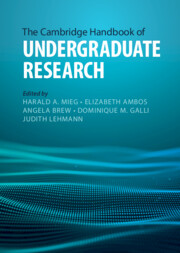Book contents
- The Cambridge Handbook of Undergraduate Research
- The Cambridge Handbook of Undergraduate Research
- Copyright page
- Contents
- Figures
- Tables
- Contributors
- Foreword
- Foreword
- 1 Introduction
- Part I Theory and Research on Undergraduate Research
- Part II Implementation, Approaches, Methods
- Part III Disciplines
- Part IV International Perspective
- Part V Avenues for Developing Undergraduate Research
- 73 Synopsis and Introduction
- 74 Community-Based Undergraduate Research
- 75 Interdisciplinary Undergraduate Research
- 76 Undergraduate Research in Digital Learning Environments
- 77 Crosscultural Undergraduate Research
- Index
- References
74 - Community-Based Undergraduate Research
from Part V - Avenues for Developing Undergraduate Research
Published online by Cambridge University Press: 11 August 2022
- The Cambridge Handbook of Undergraduate Research
- The Cambridge Handbook of Undergraduate Research
- Copyright page
- Contents
- Figures
- Tables
- Contributors
- Foreword
- Foreword
- 1 Introduction
- Part I Theory and Research on Undergraduate Research
- Part II Implementation, Approaches, Methods
- Part III Disciplines
- Part IV International Perspective
- Part V Avenues for Developing Undergraduate Research
- 73 Synopsis and Introduction
- 74 Community-Based Undergraduate Research
- 75 Interdisciplinary Undergraduate Research
- 76 Undergraduate Research in Digital Learning Environments
- 77 Crosscultural Undergraduate Research
- Index
- References
Summary
Community-based undergraduate research (CBUR) engages students as learners in research partnerships with community members, groups or agencies, for the purpose of identifying or solving community issues or effecting social change. This chapter explores the roles of the various parties in CBUR, which include, besides students and community, faculty and university managers. It is illustrated with three case studies: the University of British Columbia in Canada, which integrates CBUR with undergraduate learning; the city of Christchurch in New Zealand, where it is used to advance the process of post-earthquake recovery; and Luneburg in northern Germany, which has established a transdisciplinary CBUR programme between the city and university to encourage urban sustainability. In conclusion, future opportunities and challenges for both students and faculty in developing CBUR are discussed.
Keywords
- Type
- Chapter
- Information
- The Cambridge Handbook of Undergraduate Research , pp. 670 - 682Publisher: Cambridge University PressPrint publication year: 2022
References
- 2
- Cited by

